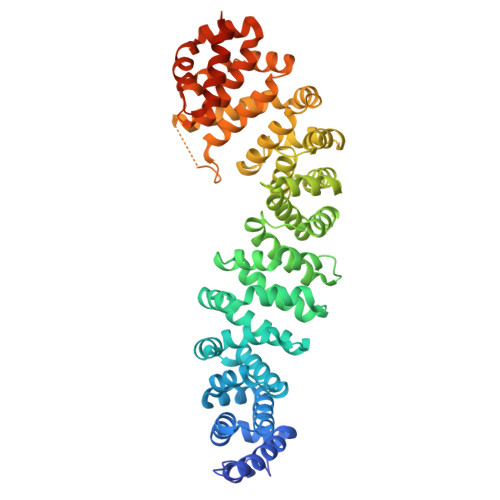Discovery of Novel 1-Phenylpiperidine Urea-Containing Derivatives Inhibiting beta-Catenin/BCL9 Interaction and Exerting Antitumor Efficacy through the Activation of Antigen Presentation of cDC1 Cells.
Zhu, W., Liu, C., Xi, K., Li, A., Shen, L.A., Li, Y., Jia, M., He, Y., Chen, G., Liu, C., Chen, Y., Chen, K., Sun, F., Zhang, D., Duan, C., Wang, H., Wang, D., Zhao, Y., Meng, X., Zhu, D.(2024) J Med Chem 67: 12485-12520
- PubMed: 38912577
- DOI: https://doi.org/10.1021/acs.jmedchem.3c02079
- Primary Citation of Related Structures:
8Z5J, 8Z61 - PubMed Abstract:
Aberrant activation of the Wnt/β-catenin signaling is associated with tumor development, and blocking β-catenin/BCL9 is a novel strategy for oncogenic Wnt/β-catenin signaling. Herein, we presented two novel β-catenin variations and exposed conformational dynamics in several β-catenin crystal structures at the BCL9 binding site. Furthermore, we identified a class of novel urea-containing compounds targeting β-catenin/BCL9 interaction. Notably, the binding modalities of inhibitors were greatly affected by the conformational dynamics of β-catenin. Among them, 28 had a strong affinity for β-catenin ( K d = 82 nM), the most potent inhibitor reported. In addition, 13 and 35 not only activate T cells but also promote the antigen presentation of cDC1, showing robust antitumor efficacy in the CT26 model. Collectively, our study demonstrated a series of potent small-molecule inhibitors targeting β-catenin/BCL9, which can enhance antigen presentation and activate cDC1 cells, delivering a potential strategy for boosting innate and adaptive immunity to overcome immunotherapy resistance.
Organizational Affiliation:
Anhui University of Chinese Medicine, Hefei 230012, China.














